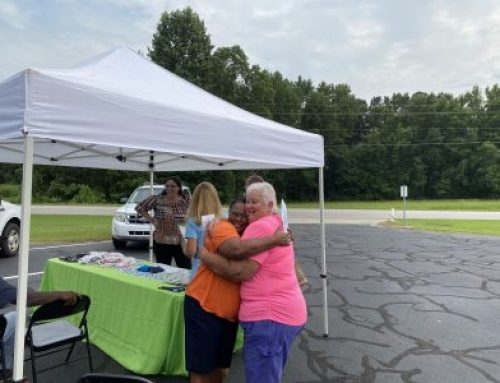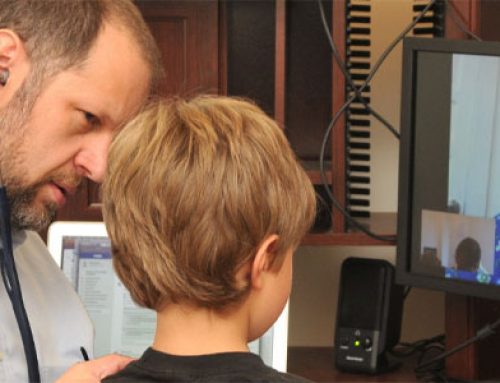By: Christa Wagner Vinson
Raleigh, N.C. — At their recent Emerging Issues Forum in Raleigh, ReCONNECT to Technological Opportunity, the Institute for Emerging Issues took us back to the future.
A future where kids connect to a world of learning, and not from a McDonald’s parking lot. A job seeker shares her skills over the Web and gets hired. A senior sees a specialist online instead of driving hundreds of miles for quality care. The natural disaster creates an emergency situation, but residents can respond safely. Local business builds a strong digital presence and enjoys more sales at the storefront.
This kind of future sounds like it should be remarkably achievable today. Yet right now in North Carolina, just 59.4 percent of people subscribe to an internet service (with rural areas and low-income households least likely to have service at home).
We believe broadband matters in North Carolina and this kind of statistic should be a thing of the past.
That’s why our team was pleased to join IEI in elevating this important issue at the Forum last month. And to keep the conversation going well past the event, we invited our colleague Christopher Mitchell, host of the Broadband Bits podcast over at the Institute for Local Self-Reliance, to record stage-side chats with some of the day’s expert speakers.
If you missed the Forum, check out the recap of three of Christopher’s podcasts below (click on the headings to link directly to the episodes), and listen to rest of the series on our website at ncheartsgigabit.com/podcasts.
Robert Gallardo on Digital Exclusion
“The No. 1 threat to community economic development today is digital exclusion,” says Robert Gallardo, assistant director of the Purdue University Center for Regional Development and one of the Forum’s keynote speakers. “If you do not address that today, it is going to be really hard for you to not only catch up, but just to start getting some traction in this digital age.”
One of the IEI Forum’s important contributions was highlighting the difference between access and adoption when it comes to community broadband planning. Access is often the first question: Is broadband available? The second question, one that has long been a focus for community development advocates working in urban areas, is whether people are using it.
Broadband planners working in less-populated areas, however, should take note, Gallardo says: “Any infrastructure investment will not be sustainable without the devices, knowledge and motivation to use it” out in the community.
As local communities put broadband plans together, Gallardo recommends they diversify their activities: focus on the infrastructure build, but make it part of a larger community economic development effort with a plan for inclusion.
(North Carolina communities will now have more resources to help. IEI announced a new grant to support digital inclusions planning, BAND-NC, Building a New Digital Economy in NC, at the Forum. Application details are on their website.)
Jeff Cox and Zach Barricklow on Remote Work in “God’s Country”
Diversified approaches might seem like a heavy lift. But for the northwest North Carolina counties of Wilkes, Ashe and Alleghany, high-quality broadband has been the gateway to new opportunity.
Dr. Jeff Cox, president, and Zach Barricklow, vice president of strategy at Wilkes Community College, talked to Christopher about how distance learning and remote work strategies are improving livelihoods in the region.
Through initiatives like Startup Northwest NC, the region is offering resources and mentoring to aspiring entrepreneurs. Before broadband, they think the area they serve wouldn’t have been competitive in attracting high-wage workers to the region – folks who bring their niche professional services jobs with them when they make a move to their mountain nirvana.
But broadband has become the region’s newest economic development recruitment tool. Superior connectivity has also been what the college and partners rely on as they help a local population increase skills and pursue better work options. For Cox and Barricklow, the broadband network is a “great leveler” – making college closer and cheaper for more folks in the area.
LaTricia Townsend and Amy Huffman on Solving the Homework Gap
And it’s not just college kids that need a shot.
“It’s everywhere. If you’re not able to do your homework because you lack access or a device, you are in that homework gap,” says LaTricia Townsend, director of evaluation programs at the Friday Institute for Educational Innovation, referring to the ways primary and secondary students without access to technology are left behind.
Townsend notes in her conversation with Chris that well over half of teachers assign homework requiring access to the internet, deeply disadvantaging students with no or poor service at home. Later in the broadcast, Amy Huffman with the NC Broadband Infrastructure Office shared state survey data that estimates the number of students likely to experience such disadvantage is as high as 20 percent. Households are not connecting for a combination of reasons: cost (which was three times as likely to be listed as a reason), the quality of service available in the area or lack of a device. But state leaders continue to take steps to reverse these troubling trends.





